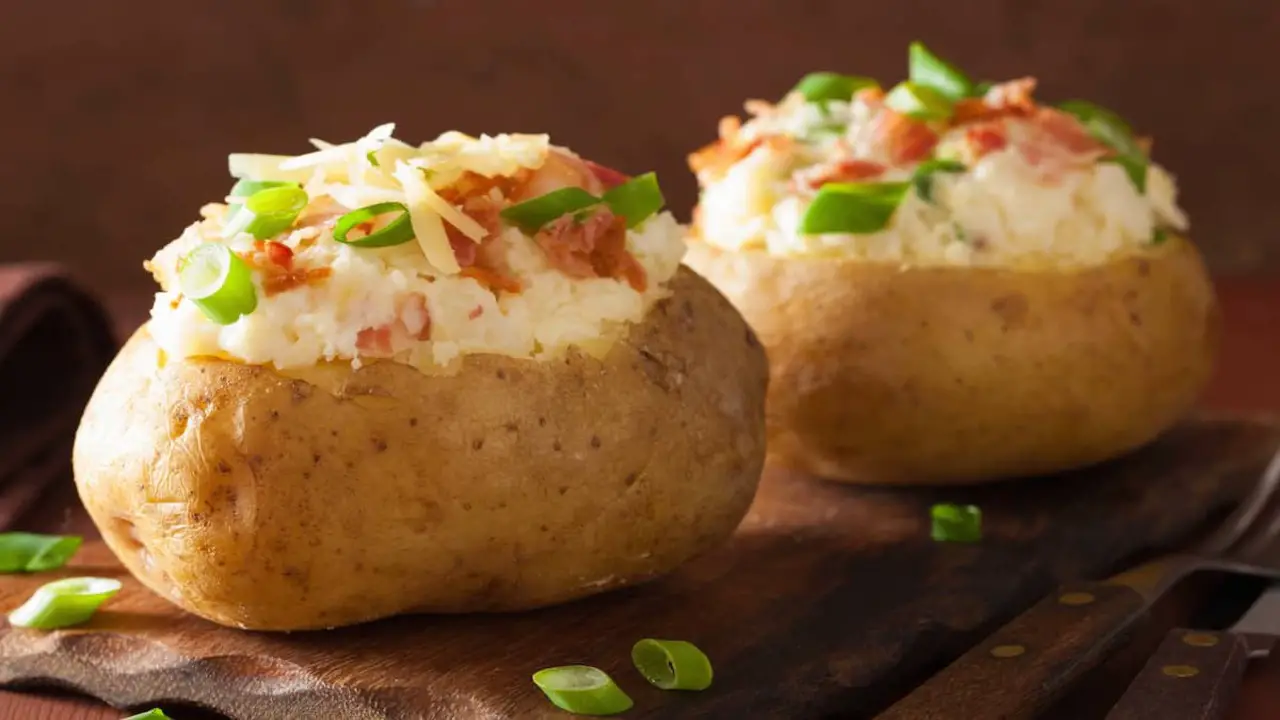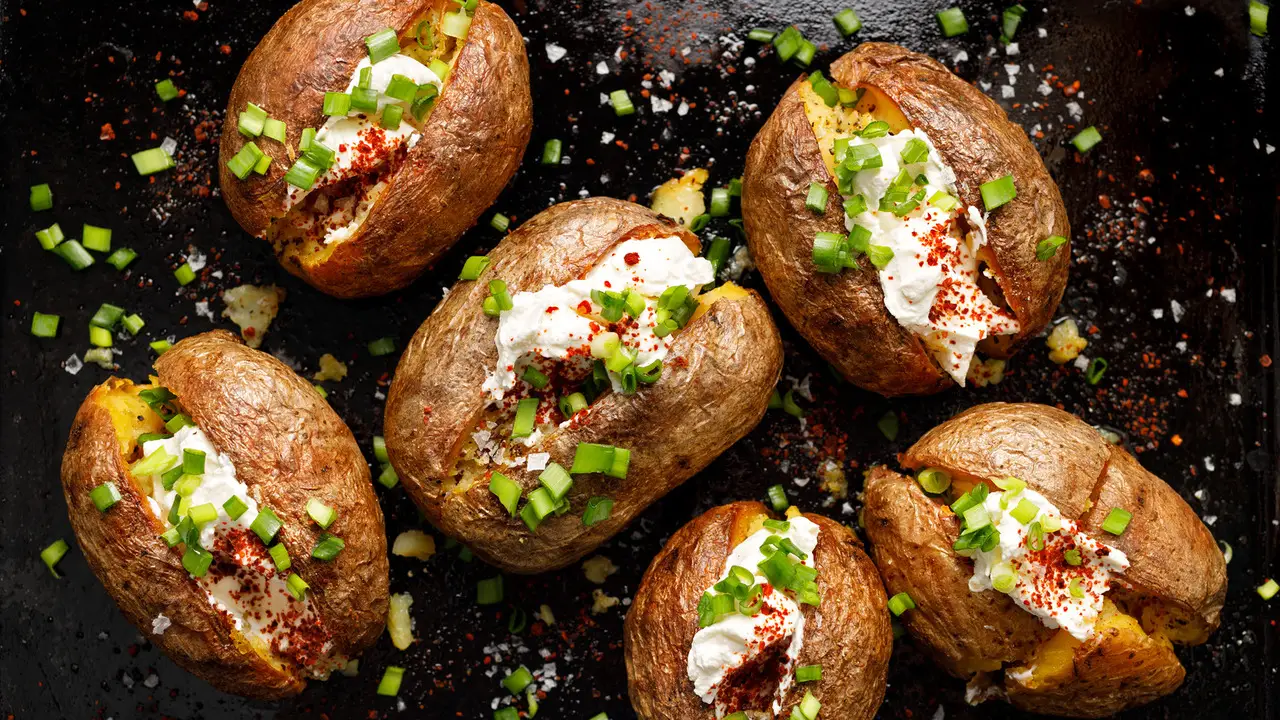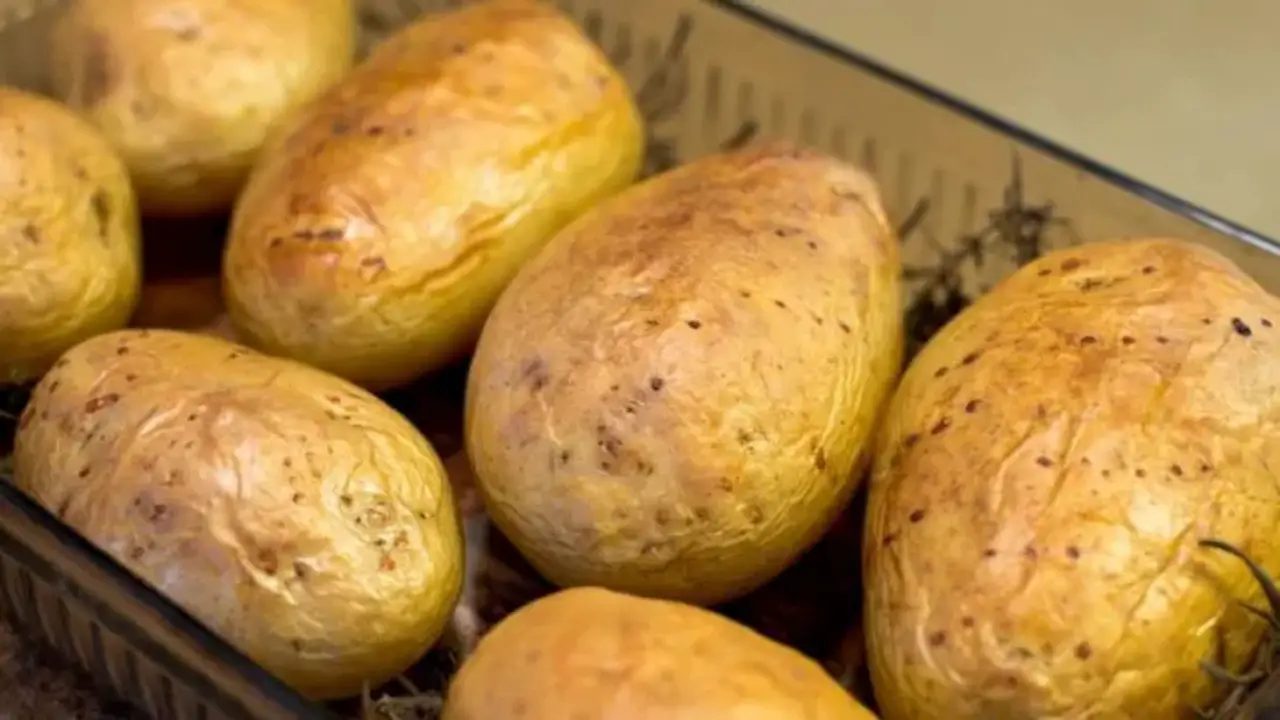People worldwide enjoy baked potatoes, a delicious and versatile dish. To make baked potatoes, they wash whole potatoes and bake them in their skins until they are tender and fluffy on the inside.
The potato’s skin becomes crispy and flavorful during baking, adding a layer of texture and taste. You can make baked potatoes a simple side dish by topping them with butter, sour cream, cheese, or other toppings.
They can also be a base for more elaborate dishes like loaded potato skins or stuffed potatoes. Whether you prefer plain or packed with toppings, baked potatoes are a comforting and satisfying addition to any meal. So, if you’ve ever had questions about the shelf life and storage of baked potatoes, this blog is for you.

Do Baked Potatoes Need To Be Refrigerated – Expert Answers

If you do not consume baked potatoes immediately, you should refrigerate them. Refrigeration helps prevent bacterial growth and keeps the potatoes fresh. Letting the potatoes cool completely before refrigerating them is important to avoid moisture buildup.
If you plan to reheat the baked potatoes, it’s best to refrigerate them first and then use the oven or microwave for reheating. Proper storage and refrigeration can extend the shelf life of baked potatoes and maintain their quality.
By refrigerating leftovers in an airtight container or wrapped in foil, you can ensure that the baked potatoes stay safe for an extended period. The baked potato is a starchy vegetable and can spoil easily if not stored properly. So, refrigeration is the best option to prevent bacterial growth and maintain the freshness of baked potatoes.
The Risks Of Not Refrigerating Baked Potatoes
Since baked potatoes can potentially grow harmful bacteria if left at room temperature for too long, people consider them a potentially hazardous food. Refrigerating them is crucial to slow down the growth of bacteria and ensure their safety.
Additionally, storing baked potatoes in the fridge helps maintain their texture, preventing them from becoming soggy or spoiled. While immediate consumption may not require refrigeration, it is always best to prioritize food safety and avoid any chances of bacteria growth.
How To Properly Store Baked Potatoes
To properly store baked potatoes, it is important to follow a few guidelines. You should not leave baked potatoes at room temperature for more than 2 hours to prevent bacterial growth. Allow the baked potatoes to cool completely before refrigerating them.
Placing the baked potatoes in an airtight container or wrapping them in aluminium foil before refrigerating is best. This helps to retain their moisture and prevent them from drying out. Properly stored baked potatoes can last in the refrigerator for up to 4-5 days.
If you have leftover baked potatoes, you don’t plan to consume within a few days; it is best to freeze them for longer storage. By following these storage practices, you can ensure that your baked potatoes stay fresh and safe for as long as possible.
Best Practices For Cooling And Packing
To ensure the safety and freshness of baked potatoes, following best practices for cooling and packing is essential. After baking, allow the potatoes to cool completely before storage to prevent bacterial growth.
Store them in airtight containers or tightly wrap them in foil or plastic to maintain quality. It’s important to refrigerate baked potatoes within 2 hours of cooking to keep them fresh. Avoid leaving them at room temperature for extended periods, leading to spoilage.
Unveiling The Lifespan Of A Baked Potato
Baked potatoes should be refrigerated within two hours of cooking to prevent bacterial growth. Refrigeration helps maintain the quality and freshness of the baked potato. Proper storage can extend the shelf life of a baked potato for up to five days. It is recommended to store baked potatoes in an airtight container or wrapped in foil.
Refrigerated baked potatoes can be reheated in the oven or microwave for a delicious meal. By following these steps, you can enjoy the baked potato for an extended period while minimizing the risk of food poisoning and spoilage. So, next time you have leftover baked potatoes, refrigerate them promptly to keep them safe and prolong their shelf life.
The Art Of Reheating: Keeping Your Baked Potatoes Fresh And Tasty

Properly storing baked potatoes is essential for maintaining their freshness and taste. While refrigeration is unnecessary, storing them in a cool, dry place is important to prevent spoilage. Storing baked potatoes at room temperature can lead to bacterial growth and the risk of foodborne illnesses.
To reheat baked potatoes, there are a few options. You can use the oven or microwave, ensuring they reach a safe temperature to avoid the growth of harmful bacteria. Leftover baked potatoes can be repurposed into delicious dishes like mashed potatoes or potato soup, offering a quick meal option. Following these guidelines, you can enjoy fresh and tasty baked potatoes without the risk of spoilage or food poisoning.
Spotting A Spoiled Baked Potato: Tell-Tale Signs

Baked potatoes can be stored at room temperature temporarily, but refrigeration is recommended for longer storage. This is because proper storage in the refrigerator can help prevent bacterial growth and extend the shelf life of baked potatoes.
It’s important to discard any baked potatoes that show signs of spoilage to avoid foodborne illnesses. So, how can you spot a spoiled baked potato? Look for a foul smell, mould growth, and a mushy or slimy texture. By being vigilant and practising proper storage techniques, you can enjoy your baked potatoes without the risk of food poisoning.
How Long Can A Baked Potato Safely Stay At Room Temperature?

To ensure food safety, following proper guidelines when handling baked potatoes is important. Leaving them at room temperature for more than 2 hours can promote the growth of bacteria and increase the risk of foodborne illnesses.
If you need to store baked potatoes for a longer period, it is advisable to refrigerate them within 2 hours of cooking. When reheating, ensure the internal temperature reaches 165°F (74°C) to ensure any potential bacteria are killed off, and the potatoes are safe to consume. By following these precautions, you can enjoy delicious and safe baked potatoes.
Does Freezing Extend The Shelf Life Of Baked Potatoes?
Freezing baked potatoes is an effective way to extend their shelf life. Once the potatoes have cooled completely, it is important to wrap them tightly in foil or store them in an airtight container before freezing. It is worth noting that freezing can slightly affect the texture and taste of the potatoes, so it is recommended to consume them within a few months for the best quality.
Are There Healthier Alternatives To Enjoying Leftover Baked Potatoes?

If you have leftover baked potatoes, there are plenty of healthier alternatives to enjoy them. One option is to incorporate them into salads, where you can chop them up and mix them with fresh vegetables and a flavorful dressing.
Another idea is to use them in soups, either by mashing them up and adding them as a thickener or by slicing them into small pieces and adding them as a chunky ingredient. If you want something warm and comforting, you can make mashed potato dishes like shepherd’s pie or loaded potato casserole.
And if you want a crispy and delicious treat, slice the potatoes and make potato cakes or hash browns. The possibilities are endless, so get creative and experiment with different recipes to make the most of your leftovers.
Conclusion
the answer do baked potatoes need to be refrigerated, yes. Storing baked potatoes at room temperature can lead to the growth of harmful bacteria and increase the risk of foodborne illnesses. To keep your baked potatoes fresh and safe to eat, it is best to refrigerate them within two hours of cooking.
Store them in an airtight container or wrap them in foil before placing them in the refrigerator. When reheating leftover baked potatoes, thoroughly kill any bacteria that may have developed. By following these guidelines, you can enjoy delicious and safe baked potatoes without any worries.
Frequently Asked Questions
1.Is It Safe To Eat Baked Potatoes Left Out Overnight?
Ans: Leaving baked potatoes out at room temperature overnight is not safe. To prevent bacterial growth, refrigerate them within 2 hours of cooking. Harmful bacteria like Clostridium botulinum can develop if left out. Store leftover baked potatoes in an airtight container in the fridge for 3-5 days.
2.Should You Refrigerate Cooked Potatoes?
Ans: Refrigerating cooked potatoes is essential to prevent bacterial growth and extend their shelf life. After allowing them to cool completely, store them in an airtight container in the refrigerator. Make sure to thoroughly reheat refrigerated cooked potatoes before consuming.
3.Do Baked Potatoes Need Refrigerated?
Ans: After cooking, baked potatoes don’t need immediate refrigeration. Let them cool at room temperature for 2 hours before storing them in an airtight container or wrapping them tightly in foil. Refrigerated baked potatoes can last up to 5 days.
4.Should You Freeze Baked Potatoes?
Ans: Freezing baked potatoes is not recommended as it can affect their texture and taste. Due to their high water content, thawed baked potatoes can become mushy. It is best to store them in the refrigerator for up to 5 days and reheat them before consuming them.
5.Why Should You Never Reheat Potatoes?
Ans: Reheating potatoes can pose risks due to the potential growth of harmful bacteria like Clostridium botulinum. This bacteria produces toxins when exposed to certain conditions, such as reheating. Additionally, reheated potatoes may lose their texture and flavor. To reduce the risk of foodborne illness, it is best to consume potatoes immediately after cooking or store them properly in the refrigerator.
6.What Are The Benefits Of Eating Baked Potatoes?
Ans: Baked potatoes offer numerous benefits for your health. They are a great source of complex carbohydrates, providing sustained energy. With their high fibre content, they aid digestion and promote a healthy gut. Additionally, baked potatoes pack important vitamins and minerals like vitamin C, potassium, and B. Including them in your diet can help you feel full for longer and support weight management.
